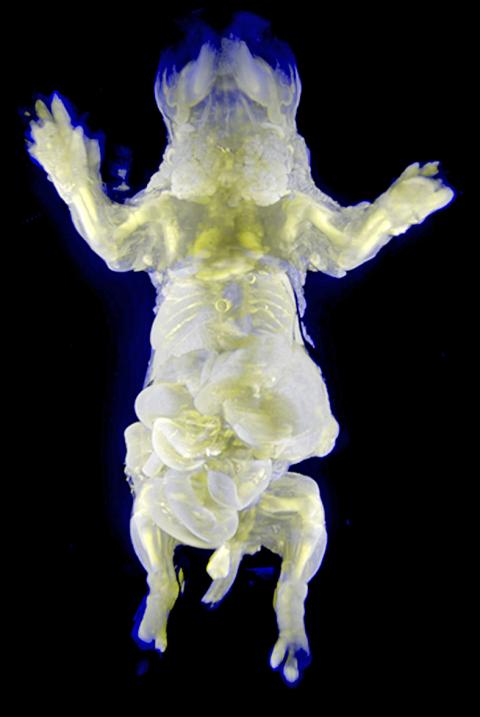Researchers in Japan have developed a way to make mice almost totally transparent.
Using a method that almost completely removes color from tissue — and kills the mouse in the process — researchers say they can now examine individual organs or even whole bodies without slicing into them, offering a “bigger picture” view of the problems they are working on.
The techniques are expected to give scientists a “new understanding of the 3D structure of organs and how certain genes are expressed in various tissues,” said Kazuki Tainaka, the lead author of a research paper published in the US-based Cell magazine.

Photo: AFP
“We were very surprised that the entire body of infant and adult mice could be made nearly transparent,” he said in a statement issued by Japanese research institute RIKEN and its collaborators.
The work, which also involved the University of Tokyo and the Japan Science and Technology Agency, focuses on a compound called heme, the constituent that gives blood its red color and is found in most tissues of the body.
The process involves pumping a saline solution through the mouse’s heart, pushing the blood out of its circulatory system and killing the creature.
A reagent is then introduced, which works to divorce the heme from the hemoglobin that remains in the animal’s organs.
The mouse is skinned and soaked in the reagent for up to two weeks to complete the process.
A sheet of laser light, which can be set to penetrate to a specific level, builds up a complete image of the body, much as a 3D printer creates physical objects in layers.
“Microscopes have so far allowed us to look at things in minute detail, but that has also deprived us of the context of what we are looking at,” Tainaka told reporters.
The new method, which cannot be applied to living things, “will give us details while enabling us to grasp the bigger picture,” he said.
Hiroki Ueda, who led the research team, said in the statement that the method “could be used to study how embryos develop or how cancer and autoimmune diseases develop at the cellular level.
It was hoped the method would lead “to a deeper understanding of such diseases and perhaps to new therapeutic strategies.”
“It could lead to the achievement of one of our great dreams: organism-level systems biology based on whole-body imaging at single-cell resolution.”

People with missing teeth might be able to grow new ones, said Japanese dentists, who are testing a pioneering drug they hope will offer an alternative to dentures and implants. Unlike reptiles and fish, which usually replace their fangs on a regular basis, it is widely accepted that humans and most other mammals only grow two sets of teeth. However, hidden underneath our gums are the dormant buds of a third generation, said Katsu Takahashi, head of oral surgery at the Medical Research Institute Kitano Hospital in Osaka, Japan. His team launched clinical trials at Kyoto University Hospital in October, administering an experimental

IVY LEAGUE GRADUATE: Suspect Luigi Nicholas Mangione, whose grandfather was a self-made real-estate developer and philanthropist, had a life of privilege The man charged with murder in the killing of the CEO of UnitedHealthcare made it clear he was not going to make things easy on authorities, shouting unintelligibly and writhing in the grip of sheriff’s deputies as he was led into court and then objecting to being brought to New York to face trial. The displays of resistance on Tuesday were not expected to significantly delay legal proceedings for Luigi Nicholas Mangione, who was charged in last week’s Manhattan killing of Brian Thompson, the leader of the US’ largest medical insurance company. Little new information has come out about motivation,

‘MONSTROUS CRIME’: The killings were overseen by a powerful gang leader who was convinced his son’s illness was caused by voodoo practitioners, a civil organization said Nearly 200 people in Haiti were killed in brutal weekend violence reportedly orchestrated against voodoo practitioners, with the government on Monday condemning a massacre of “unbearable cruelty.” The killings in the capital, Port-au-Prince, were overseen by a powerful gang leader convinced that his son’s illness was caused by followers of the religion, the civil organization the Committee for Peace and Development (CPD) said. It was the latest act of extreme violence by powerful gangs that control most of the capital in the impoverished Caribbean country mired for decades in political instability, natural disasters and other woes. “He decided to cruelly punish all

NOTORIOUS JAIL: Even from a distance, prisoners maimed by torture, weakened by illness and emaciated by hunger, could be distinguished Armed men broke the bolts on the cell and the prisoners crept out: haggard, bewildered and scarcely believing that their years of torment in Syria’s most brutal jail were over. “What has happened?” asked one prisoner after another. “You are free, come out. It is over,” cried the voice of a man filming them on his telephone. “Bashar has gone. We have crushed him.” The dramatic liberation of Saydnaya prison came hours after rebels took the nearby capital, Damascus, having sent former Syrian president Bashar al-Assad fleeing after more than 13 years of civil war. In the video, dozens of